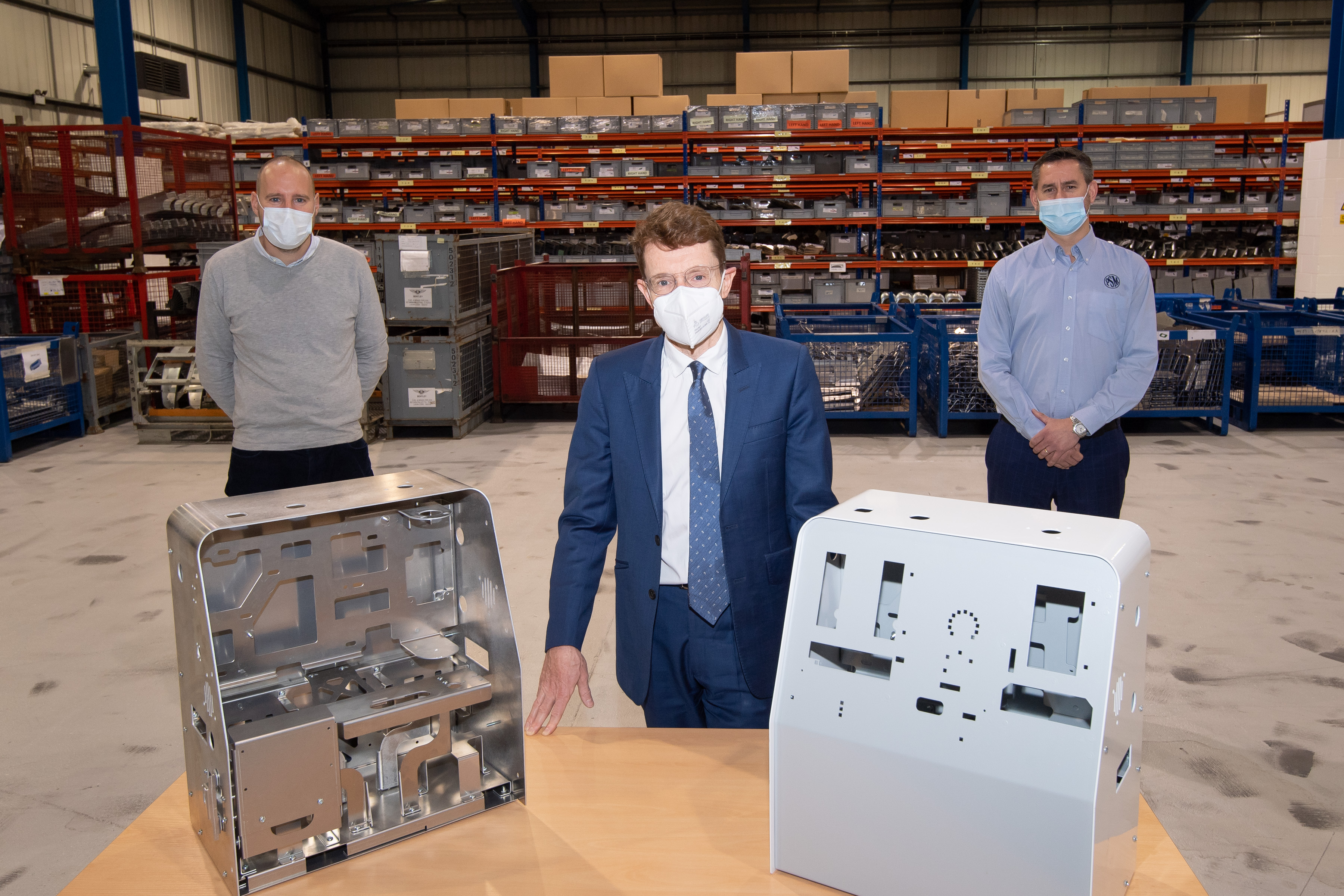Innovative car parts company uses engineering skills to help save Covid-19 patients
Published: Wednesday 28 Oct 2020
A luxury car parts manufacturer has been held up as a prime example of West Midlands manufacturing innovation after playing a key role in the nation's battle against coronavirus.
Coventry-based Park Sheet Metal, which normally makes components for the likes of Aston Martin, Bentley and Jaguar Land Rover, was called on to use its expertise to help manufacture up to 10,000 ventilators to treat critically ill Covid-19 patients.
Park Sheet Metal, which was founded in 1947 and is one of the region's fastest growing automotive companies, was able to step up and answer the call to arms because it had recently invested in expanding its production capacity.

Mayor of the West Midlands Andy Street (centre) with Graham Penter (left), Director of Park Sheet Metal and Darryl McNey, Head of Sales
This included setting up a new distribution centre in a leased building at Bermuda Park, which had been constructed by a local developer with more than £2.4m of funding from the West Midlands Combined Authority (WMCA).
The facility was a key part of addressing the logistical challenge of manufacturing, assembling and distributing 10,000 ventilator cases in a short timeframe.
Mayor of the West Midlands and chair of the WMCA, Andy Street, visited the company's premises at Bermuda Park to see how the move has not only enabled it to expand its operations and its workforce in the area, but also work with Dyson on providing ventilators for the NHS.
The Mayor said: Here in the West Midlands we have some of the most innovative and resourceful companies in the world, and Park Sheet Metal is a prime example of that.
By turning their hand to manufacturing ventilators, the company has not only managed to help the country at this time of crisis, but also demonstrated the sort of adaptability that will be needed to drive our economic recovery from this pandemic.
The company deserves enormous credit for its work, and I am pleased the WMCA was able to play its part in helping the Park Sheet Metal team move into a new distribution centre
Having worked with Dyson previously on its electric car project, Park Sheet Metal was contacted by the company, headed by British inventor Sir James Dyson, back in March after the government ordered 10,000 ventilators.
Dyson had hundreds of engineers working to design the ventilators from scratch but turned to Park Sheet Metal for help in producing multiple complex components for the ventilators.
Park Sheet Metal geared up its operations to meet the 10,000 ventilator target but fortunately manufacturing was able to be scaled down as the three-month lockdown between March and June began driving down the number of Covid-19 patients requiring the life-saving equipment.
Graham Penter, director of Park Sheet Metal, said: Our team of engineers worked day and night alongside the engineers at Dyson to produce the components, designing, manufacturing and revising prototypes within hours, a process that would normally take weeks or months.
We soon identified that this was not just an engineering challenge. In order to deliver 10,000 assembled and finished units, there were also significant logistic hurdles.
We would not have been able to gear up our operations during lockdown to deliver this many ventilators without having this top-class facility which, of course, was facilitated in part with the help of WMCA funding.
Ultimately, because the ventilator project was scaled back, we did not need to produce the full 10,000, which was clearly good news for the country.
I would like to think, however, that this was a very good demonstration of a local automotive business using its engineering skills in a really important way. It also demonstrates the strength of our local supply chain as our key suppliers supported us throughout and were a key part of this project
Despite Covid-19 cases increasing once again in the UK, the Government has not yet called on the manufacturing sector to start delivering more ventilators.
Graham added, however: Working with Dyson gave us invaluable experience and we are ready and able to support the fight against Covid-19 with another ramp up of our operations
What is a ventilator?
A ventilator is a machine that helps a person breathe by getting oxygen into the lungs and removing carbon dioxide
Ventilators can be used to help a person breathe if they have lung disease or another condition that makes breathing difficult. They can also be used during and post-surgery
A tube, connected to a ventilator machine, is placed in a person's mouth, nose or through a small cut in the throat (called a tracheostomy)